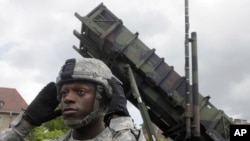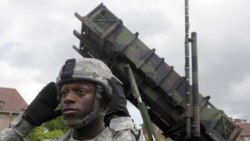“The United States is proud to have supported the political, economic, and social aspirations of Central Europeans,” said U.S. Assistant Secretary of State for European and Eurasian Affairs Philip Gordon. Over the last two decades, the U.S. has assisted transitions in Central Europe from Communist regimes to modern democracies, investing 4.8 billion dollars in assistance to countries across the region. In recent years, the U.S. has continued to support defense modernization through security assistance, enabling Central European countries to develop advanced and interoperable capabilities.
A close relationship with the United States continues based on shared values and a common commitment to protect those values. All these countries remain inextricably linked by the commitment to NATO’s Article 5, according to which an attack on one is an attack on all. The Administration’s European-Phased Adaptive Approach to missile defense plan also demonstrates the U.S. commitment to European security as the proliferation of ballistic missiles outside of Europe pose a real and growing threat to the alliance.
The countries of Central Europe are making important contributions to the International Security Assistance Force in Afghanistan, deploying a combined total of over 6,500 troops.
The U.S. and Central Europe continue be linked not just militarily but economically. Since the fall of the Berlin Wall, the U.S. has provided over 560 million dollars to establish enterprise funds to promote sustained economic growth in countries that were transitioning from centrally planned to market-based economies.
Having found political and economic success, many Central European countries are eager to help expand the zone of democracy, prosperity and stability to the former Soviet Union. In an effort to facilitate that, the U.S. created the “Emerging Donors Challenge Fund.” The fund serves as an incentive to identify and co-fund assistance projects. To date, the U.S. is co-financing 23 projects with Central European partners in the areas of rule of law, democracy, free media, civil society and economic growth in key countries in Eurasia and the Western Balkans.
The countries of Central Europe have demonstrated that they are capable, democratic partners ready to address the region’s challenges. “Together,” said Assistant Secretary Gordon, ”we can continue the hard work of completing the ‘unfinished business’ in Europe’s east and responding to unfolding challenges in the wider world.”
A close relationship with the United States continues based on shared values and a common commitment to protect those values. All these countries remain inextricably linked by the commitment to NATO’s Article 5, according to which an attack on one is an attack on all. The Administration’s European-Phased Adaptive Approach to missile defense plan also demonstrates the U.S. commitment to European security as the proliferation of ballistic missiles outside of Europe pose a real and growing threat to the alliance.
The countries of Central Europe are making important contributions to the International Security Assistance Force in Afghanistan, deploying a combined total of over 6,500 troops.
The U.S. and Central Europe continue be linked not just militarily but economically. Since the fall of the Berlin Wall, the U.S. has provided over 560 million dollars to establish enterprise funds to promote sustained economic growth in countries that were transitioning from centrally planned to market-based economies.
Having found political and economic success, many Central European countries are eager to help expand the zone of democracy, prosperity and stability to the former Soviet Union. In an effort to facilitate that, the U.S. created the “Emerging Donors Challenge Fund.” The fund serves as an incentive to identify and co-fund assistance projects. To date, the U.S. is co-financing 23 projects with Central European partners in the areas of rule of law, democracy, free media, civil society and economic growth in key countries in Eurasia and the Western Balkans.
The countries of Central Europe have demonstrated that they are capable, democratic partners ready to address the region’s challenges. “Together,” said Assistant Secretary Gordon, ”we can continue the hard work of completing the ‘unfinished business’ in Europe’s east and responding to unfolding challenges in the wider world.”

















